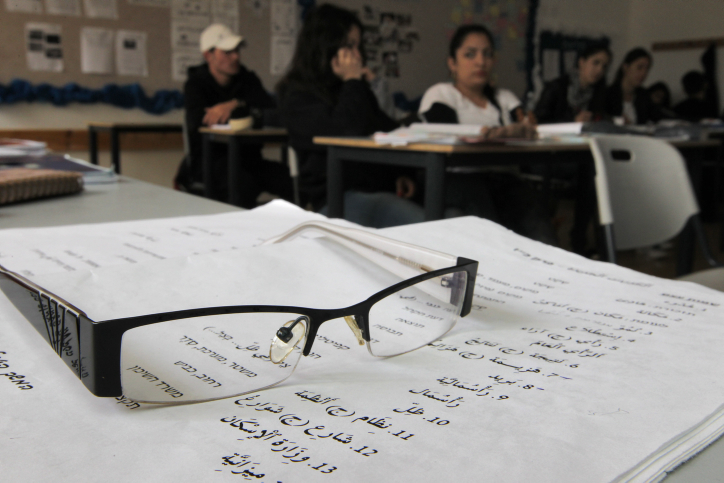A new study shows that Jewish Israeli teens who studied Arabic in elementary school have a better appreciation for Arab society later on. As the government continues its attacks on Arabic, it is imperative that teachers and parents fight to ensure children learn the language.
By Gil Gertel

The so-called nation-state bill, which passed its first reading in the Knesset last week, is not intended to uphold Israel as the “nation-state of the Jewish people” as per MK Avi Dichter (Likud), the original author of the bill, in 2017. The privileges of Jews in Israel are well protected, including legally, as well as through the state’s police and military power. The nation-state bill is actually intended to further harm and humiliate those who are not Jewish. Step by step, we are bearing witness to a fascistic spiral: he who is strong remains on top; he who is weak is humiliated.
These days, we don’t need to guess how the results of a steady attack on human rights look, especially vis-a-vis those who are not part of the ruling nation. But how do we stop the downfall? Among the different options, I propose that parents and educators demand and promote Arabic learning in Hebrew elementary schools. This is crucial at a time when the government and the Knesset are trying to minimize the presence of Arabs in the country. Teaching the language could be a step in the opposite direction.
Elementary Arabic
Arabic is compulsory for middle schoolers in Israel. Elementary schools have two different programs for Arabic learning, whose books were approved by the Education Ministry. Both programs were developed and are implemented by organizations that are unrelated to the minister: “Ya Salaam” (يا سلام), which was developed by the Abraham Fund Initiatives, and the program “Let’s Talk” (تعالوا نحكي), which was developed by the Merchavim Institute for the Advancement of Shared Citizenship in Israel.
On the basis of these two programs, the Education Ministry published in May 2016 a compulsory spoken Arabic curriculum for grades 5 and 6. During a hearing in the Knesset’s Education, Culture, and Sports Committee, Chairman Yakov Margi (Shas) emphasized the importance of Arabic education in Israel, and called on the Education Ministry to “increase the number of hours dedicated to teaching the language, and decrease the number of exemptions given to schools [middle schools, especially religious ones] from teaching Arabic.”
(Full disclosure: I had the honor of heading Let’s Talk’s development team on behalf of Merchavim.)
Arabic letters and Arab teachers
First of all, let’s establish that Arabic will be taught without use of transliteration, since the letters of the language are integral to Arab culture. The idea of using transliteration, that is, writing in Arabic in Hebrew letters, stems from Hebrew speakers’ feelings of superiority and condescension. After all, no one would dare think of teaching English or French in Arabic letters.
The explanation for using transliteration, which Education Ministry officials still hold fast to, do not stand the test of reality. They claim that the letters do not allow for a true representation of how the language is actually spoken. While that may be true, it is absurd to think that Hebrew letters are better suited to do so. Officials also claim that Arabs do not write in spoken Arabic, an absurd argument that can easily be debunked with one visit to social networks. Finally, they argue that it is extremely difficult for young children to grasp the shape of Arabic letters, because of their contours and the fact that they are connected. Come on, as if cursive isn’t connected?
A unique aspect of the program is that Arab teachers will teach in Hebrew schools, in order to more authentically represent both the language and Arab culture. The success of this move has been moving to see. After only several awkward moments, the students came to accept the presence of the Arab teacher as something that goes without saying — the way it was meant to be.
When even the mere thought of an Arab teacher entering a Hebrew-speaking class excites us, one understands just how imprisoned we are in a culture of fear. After all, can anyone in the free world imagine a teacher not being accepted to a school because of their religion or ethnicity? Merchavim entrenched this idea, and is working in partnership with the Education Ministry to integrate Arab teachers in other professions as well.
A different attitude
A Merchavim study set to be published this year looked at attitudes held by 10th grade students vis-a-vis both Arabic and Arab society. The results surprised even the most optimistic of the researchers: students who learned Arabic in elementary school through Let’s Talk were shown to have more positive attitudes toward both the language and Arab society in Israel, as opposed to students who did not study Arabic in elementary school. Studying Arabic in elementary schools brought about a “positive and equality-based attitude toward Arabs in Israel” among students, as well as recognition of the importance of knowing the language, preference for studying Arabic with Arab teachers, and a willingness to take part in meetings with Arab teenagers.
Now it’s time for Israeli parents and educators to push to teach Arabic in elementary schools.
Gil Gertel is an educator and a blogger at Local Call, where this article was originally published in Hebrew.
